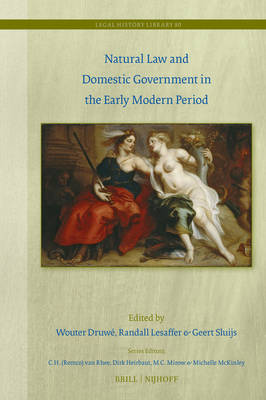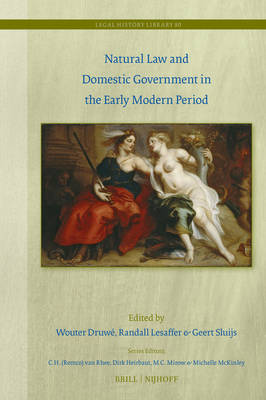
- Afhalen na 1 uur in een winkel met voorraad
- Gratis thuislevering in België vanaf € 30
- Ruim aanbod met 7 miljoen producten
- Afhalen na 1 uur in een winkel met voorraad
- Gratis thuislevering in België vanaf € 30
- Ruim aanbod met 7 miljoen producten
Zoeken
Natural Law and Domestic Government in the Early Modern Period
€ 219,95
+ 439 punten
Omschrijving
Natural Law and Domestic Government in the Early Modern Period examines how natural law informed evolving ideas of governance from the sixteenth to eighteenth centuries. Through case studies spanning France, the Low Countries, England, Iberia, and colonial America, this volume explores how jurists, theologians, and political thinkers grappled with questions of sovereignty and justice. Contributors analyse influential figures from Bodin and Coke to Tuldenus and Lipsius, tracing how natural law intersected with legal concepts of rights, obligations, contracts, and associations. By uncovering diverse and contested uses of natural law, this collection offers a nuanced account of its enduring role in shaping early modern statecraft and political thinking.
Contributors are: Marie Seong-Hak Kim, Rafael Cronje Mateus, Jeffrey Dymond, Pedro Ricardo da Silva Santos, Geert Sluijs, Paolo Astorri, Lars Cyril Nørgaard, Rosalind Acland, Carlos Pérez-Crespo, Signy Gutnick Allen, Sarah Limão Papa, and Alain Wijffels.
Contributors are: Marie Seong-Hak Kim, Rafael Cronje Mateus, Jeffrey Dymond, Pedro Ricardo da Silva Santos, Geert Sluijs, Paolo Astorri, Lars Cyril Nørgaard, Rosalind Acland, Carlos Pérez-Crespo, Signy Gutnick Allen, Sarah Limão Papa, and Alain Wijffels.
Specificaties
Betrokkenen
- Uitgeverij:
Inhoud
- Aantal bladzijden:
- 292
- Taal:
- Engels
- Reeks:
- Reeksnummer:
- nr. 80
Eigenschappen
- Productcode (EAN):
- 9789004748705
- Verschijningsdatum:
- 18/12/2025
- Uitvoering:
- Hardcover
- Formaat:
- Genaaid
- Afmetingen:
- 155 mm x 235 mm

Alleen bij Standaard Boekhandel
+ 439 punten op je klantenkaart van Standaard Boekhandel
Beoordelingen
We publiceren alleen reviews die voldoen aan de voorwaarden voor reviews. Bekijk onze voorwaarden voor reviews.







